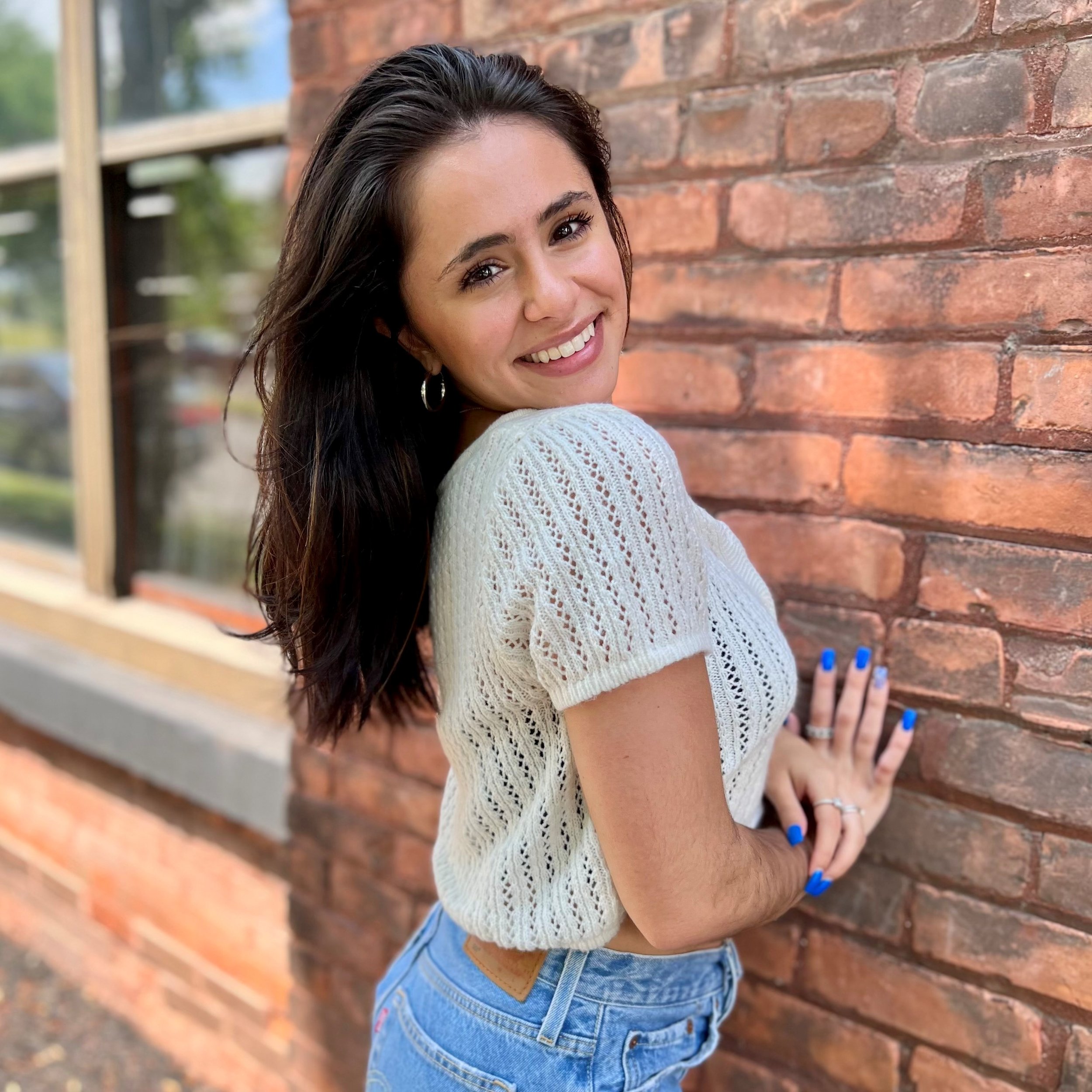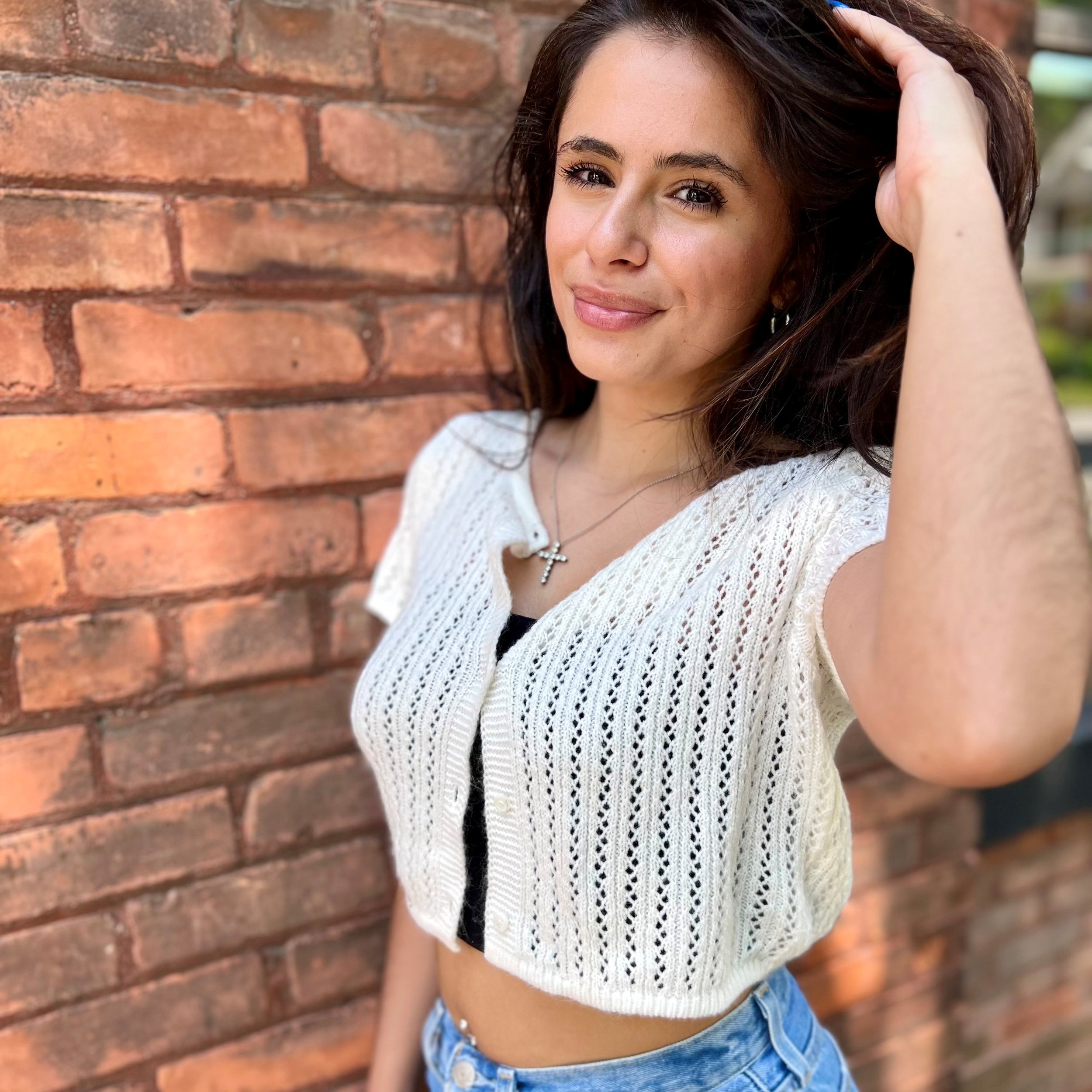Isabella Bobbo
“To fight stigma is to educate those around me. I do this by sharing my story and the knowledge I’ve gained from the experiences I’ve had. Although I’m only one voice, you never know who may be listening around you.”
NAMI: What has your mental health journey been like? Why are you passionate about advocating for mental health awareness?
IB: The first thing I can say is that my answer to this question would’ve looked very different if I had been asked a couple of years ago. My mental health journey has been hard, but I wouldn’t be the person I’ve become today without it. I have been dealing with mental health struggles since I was about 15 years old. I have always been seen as someone extroverted, high energy, and talkative, but under that is a girl who has dealt with a lot of pain and trauma. Growing up as a kid, cheerleading was my dream. I loved being a part of a team and traveling to different places with some of my best friends. I knew things started to get serious for my mental health when I started to lose interest in the one thing I loved. I ended up quitting cheerleading and fell into a deep hole after that. I had a hard time at school socially and academically, I was very alone and sad most days, home life was problematic, and I had low energy and intense emotions. My high school years were one of the most difficult times of my life. I was dealing with symptoms of major depressive disorder and was admitted to the inpatient care unit twice in two years. Fortunately, I could get through those years of my life and graduated high school, and got into college. Going into my senior year of college at the University of Tampa majoring in psychology, my life has changed drastically. The reason why I say this is because I have learned so much from the times I was at my lowest.
IB: If I had to go back in time and talk to my old self I would say that everything is going to be okay. One thing I learned is that my mental health does not define me. Depression does not define me. My past does not define me. I gained strength and resilience from my battles and that’s pretty dang powerful! I still have my tough days but I can get myself out of a dark place much faster than I did before. I can take my mental health journey and spread awareness to those around me and hopefully pursue a future career in the field of mental health. I want to advocate as much as possible for mental health because I never want anyone to experience the things I went through and if they have experienced it, I want them to know they are not alone. It is not an easy topic to discuss, but the more we talk about it, the more people will feel comfortable sharing their stories.
NAMI: How have you healed and grown from your experiences?
IB: Overall, I am always in my healing era. I am a person who takes time for myself and reflects on everything in my life. I am human and I make mistakes and there are always things I can improve on. When something hurts me or affects my mental health, I allow myself to feel all the emotions that come with it. Even if it ends up in a long cry session, it feels good to let my body and brain release all of the stress, anxiety, and sadness I’m feeling. I am big on improving my interpersonal skills and part of that came from wanting to change my life around when I was experiencing high levels of depression. I came to a certain point where I didn’t want the depression to take up most of my days and make me miss out on life, especially since I was young. I am much better at using coping skills and strategies to get me out of weird funks because I have learned so much about myself over the years and continue to do so.
NAMI: What forms of mental health-related stigma have you observed or run into personally? How do you combat stigma?
As someone who has experienced having a mental illness, it doesn’t go unheard or unnoticed when there is stigma. Over the years, I have noticed small things that have to do with depression specifically. If I am lacking motivation or energy one day, it would be seen as me being lazy or not wanting to do anything. I tend to cry a lot and get into low moods with certain triggers and sometimes I can be seen as too emotional or too sensitive. I have been told that I would not be able to do many things in life such as going to college or having a job because of setbacks from depression. In the past when I have expressed some of my concerns about my mental health, it was often overlooked and I wasn’t taken seriously. One of the things I see apart from my own experiences is understanding when to use the right terminology. For instance, the difference between depression and sadness, which some may think is the same thing. Although both deserve equal attention, they are not the same. Depression is an illness and sadness is not. To fight stigma is to educate those around me. I do this by sharing my story and the knowledge I’ve gained from the experiences I’ve had. Although I’m only one voice, you never know who may be listening around you.
NAMI: You are a college student! In your experience, what are some of the challenges college students are facing today? How can the community support the mental health of college students?
IB: There are a lot of expectations going into college, especially the idea of the “college experience”. This can look like having a large group of friends, going out, being involved in an activity or club, and the list goes on. This can be harder for some than others to achieve, especially as a freshman being away from home for the first time and not knowing anyone. I used to want to be engaged in this idea of the “college experience” for my first couple of years at school to fit in and tell my friends and family at home that college is the best thing ever, but in reality, it wasn’t. It turns out I don’t like partying or going out, I’d rather stay in and get a pizza and put on a movie. Also, I enjoy having a few friends rather than a large group because I felt I have made some stronger connections with people this way. A lot of stress and anxiety came from not living up to the college experience I had planned, but then I found what is comfortable for me and what I enjoy, and turns out I’m a lot happier. I’ve talked to many peers around me who have experienced the same thing as me, which leads me to say that college is what you make of it. There is no right or wrong way to be successful and useful in your years of youth. In the college community, I am a member of an organization called Active Minds, where I have met some amazing people and have had the chance to talk to other students about some of these pressures. A lot of college campuses have organizations similar to Active Minds, which I think college students should participate in if they are passionate about mental health. College can be hard, and having a group of peers around you to support you is something I’ve found helpful.
NAMI: You are interning with NAMI Roc this summer! What interested you in working with NAMI Roc?
IB: I am so honored to be working with NAMI Roc this summer and I’ve already met some phenomenal people from being just a few weeks in. I have heard about the organization through mutuals and have heard about its amazing reputation. I wanted to find somewhere where I can talk about mental health freely and feel safe and heard, as well listening to other people's stories and continue to learn more about the topic. It is always nice speaking to someone who gets it and I don’t feel like I’m being judged. I love how everyone is open and genuine while conversating which makes things way easier to do. I also enjoy the many events and resources that NAMI Roc offers. It feels like a huge family!
NAMI: What words would you share to encourage others in their mental health journey?
IB: Time will tell your healing.
Your story is unique to its own.
You are your biggest supporter.
The toughest battles make you the strongest warrior.
Life is beautiful, find your meaning.



